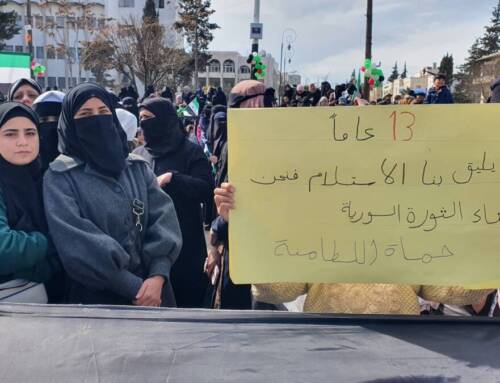Fall of A-Tabqa airport means ‘total IS control over A-Raqqa’
August 18, 2014 Since taking over regime brigades 17 and […]
18 August 2014
August 18, 2014
Since taking over regime brigades 17 and 93 northwest of A-Raqqa city this summer, the Islamic State has virtually eliminated the regime’s military presence in the north-central A-Raqqa province.
The Tabqa military airport is the one exception. It is a well-fortified base which falls roughly 8km southeast of IS-controlled A-Tabqa city.
The Islamic State launched its most recent attack on the airport over the weekend, with the monitoring group Syrian Observatory for Human Rights reporting Sunday that IS has achieved “progress.”
Beyond the symbolic victory of controlling A-Raqqa province entirely, the fall of A-Tabqa airport could prompt the IS to move west into Hama province.
Capturing the airport “will pave the way for an advance towards A-Salamiya, located in the outskirts of Hama, the province adjacent to A-Raqqa’s southwest border,” Ahmed Abu Bakr, a media activist in A-Raqqa, tells Syria Direct’s Mohammed al-Haj Ali.
Q: Why is A-Tabqa military airport important to the Islamic State (IS)?
A-Tabqa military aiport is considered one of the most powerful Syrian regime military formations in the vicinity of A-Tabqa city, which is located in the western outskirts of A-Raqqa. If IS manages to liberate the airport, that will mean total IS control over A-Raqqa province, and the absence of any regime presence. Additionally, if IS manages to liberate the airport, it will pave the way for an advance towards A-Salamiya, located in the outskirts of Hama, which is adjacent to A-Raqqa along the latter’s southwest border.
Q: What is inside the airport? Arms and ammunition? How many regime soldiers are inside the airport?
A-Tabqa airport contains two warplane squadrons, six war helicopters, a number of 130mm field guns, mortars, four tanks, a number of BMP’s, and large stores of ammunition—especially tank and artillery ammunition. The number of soldiers located in the airport and the nearby Al-Ajrawi checkpoint—part of the airport, located on its Western entrance on Al-Ajrawi hill—is around 800. Add to that everyone who arrived at the airport after fleeing brigades 17 and 93 [regime brigades in A-Raqqa province, captured in July and August, respectively].
Q: After IS captures A-Raqqa, what will it have gained strategically? And after A-Raqqa, what is IS planning to do?
IS currently controls all of A-Raqqa province, from every direction. IS was able, over the course of last month and the beginning of this month, to spread its control over two regime military checkpoints. The only regime point remaining in A-Raqqa is the military airport. As for IS’s strategy after A-Raqqa, I don’t know—they don’t speak openly about their plans.
Q: What are living conditions like for civilians inside A-Raqqa province?
The living conditions for civilians in A-Raqqa are awful, especially after humanitarian aid to the province decreased following the IS takeover, and due to the scarcity of work, the lack private businesses, factories and large workshops that helped to provide work opportunities previously.
It’s worth mentioning that A-Raqqa contains more than 500,000 displaced Syrians from other provinces. Add to that over 200,000 needy and poor. Forty percent of the people of A-Raqqa used to depend on government-sponsored jobs, most of whom today no longer receive a salary from the government. That’s because either the government stopped paying, or because the employee is afraid of getting arrested when he goes to collect his salary from government-controlled areas.
Q: What are the most important services IS provides to civilians?
IS provides all sorts of services in terms of infrastructure, cleaning, etc. But IS also collects fees from civilians for its services—for example, phone service, which only works within A-Raqqa, costs 400 Syrian Pounds [a few dollars], despite that fact that phone service worked before IS came to A-Raqqa and doesn’t cost IS anything to maintain. Likewise for electricity, water and cleaning. IS collects monthly fees for cleaning from shop owners.
For more from Syria Direct, like us on Facebook or follow us on Twitter.








